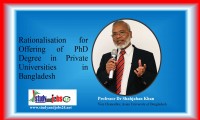
A true account of young man’s slow descent into radicalism
I was born in 1990’s Dhaka. As a child I had been cheerful and energetic. I grew up in a time when very few families had cable TV, only professionals used computer, no one knew what the internet was and smartphones didn’t exist. I remember eagerly waiting for the sound of Asr azaan, and I would rush out of the house as soon as I could hear it and join other kids in the playground. Unlike today’s Dhaka, we used to have large fields in the neighbourhood where we played cricket in the scorching heat of summer, splashing in puddles while chasing a football in the rain. We spent chilly winter evenings playing badminton. I studied at a small kindergarten in Purana Paltan till junior school.
Things started to change as I grew up. I started coming back home in tears. Playground fights are common enough. Looking back now, however, I know that that was when I started to get bullied for my eccentricities. My parents, who were rather friendly and simple minded, never encouraged me to hit anyone. Seeing that I was having hardships getting along with my peers, they gave me books to read. We had books. Lots of books. Soon I found more pleasure in the world of Aesop’s fables, Shukumar Ray and Thakurmar Jhuli. It was vastly preferable to going out to play and returning with bruises.
During middle school, we moved house, and I enrolled at a renowned missionary school. It was deemed prestigious to have a place in a school like that, and my parents were happy for me. This happiness was short-lived. During my days at the new school, my parents never saw me return home crying or heard me complaining about classes, and so were unaware that I was bullied by my peers and seniors. In addition, I was shocked by the immense amount of homework I was starting to get. To make things worse, the teachers started to insist that I join their coaching centres. Soon, my days were reduced to a rigid routine of classes at school, going to several private tutors a day and returning home with piles of homework.
I started to change. I was no more the cheerful and sociable kid. Unable to cope up with the study pressure, I started showing early signs of depression and anxiety. The final blow came when my class teacher, who could not motivate my parents to enrol me at his private tuition, (because I was already attending three other private classes) was ‘dissatisfied’ with me and I ended up with grades so poor that the school authorities refused to let me advance to the next grade.
Disaster ensued. My parents realised the true nature of the so-called ‘Successful Schools’ and decided I should study somewhere else. They searched far and wide, school after school, pleading with authorities and principal to allow me an opportunity to study at their schools. But the ‘renowned’ schools maintained that a child with bad grades should not be allowed a chance to continue his studies because he will only be a liability to their reputation.
I was entering puberty, introverted but yearning for friendship. I felt trapped within the four walls of my room as I struggled with depression and frustration. I was so ashamed that I wouldn’t go out to play, and avoided talking to anyone about my studies or how life was going in general. With much difficulty, I got into a school in Old Dhaka but the ranking of the school and the socio-economic status of those who studied there was so low that it only added to my feelings of shame and inferiority. I’d skip school, grew an addiction to violent video games and engaged in frequent self-harming.
My parents understood what I was going through so they let me skip classes, but I had to attend sessions at a coaching centre. Even there, being the only boy among twenty students, someone who grew up in isolation and was too shy to talk to girls of his age, I was teased mercilessly by my classmates.
There was a mosque nearby and I often went there to pray. My home, school, and coaching centre made me restless. But in there, I found a strange tranquillity; I would sit there in silence for as long as I could manage.
One day, a young man, probably in his mid 20’s approached me. I had seen him before, reciting Al-Quran and always carrying a side-bag. After some small talk he casually wanted to know where I lived, where I studied, what my parents did. He told me he’d noticed that I’d often come to the mosque and sit alone. I was initially suspicious. My parents had told me to avoid strangers. But he seemed very nice.
Weeks passed. I often met him at the mosque and we conversed. On one particular day, one of my fellow classmates had humiliated me for not showing interest in talking to her. I was upset even at the mosque, and the guy noticed I was crying. He asked me what had happened and I, in my weakness, poured my heart out to him. I told him about my miseries and he listened. I told him how I hated the world, my teachers, my life, and how much I wished to harm my bullies and take revenge if I had any chance. The guy listened and commented that girls are evil creatures and they lead men to sinful deeds. He said that I was on the right path and that Allah would help me. For the first time in ages I felt that someone understood me. We became friends.
Ramadan was approaching. One day, on my way to school I ran into the guy. He gave me a leaflet invitation to a gathering of young Muslims and recommended that I should attend the event. My parents had always told me not to go to unknown places with strangers and even though we’d become friends, I was a bit hesitant. I told him that my mother would worry about me and might not let me attend. He then said that in Islam, the cause of Allah comes first and one is allowed to disobey one’s mother if she is against the cause. I asked him if it wasn’t true that our Prophet (PBUH) had stated that the Jannat of children lies under the feet of their mother. He then quoted something in Arabic, saying that it reinforced his statement. I was a bit puzzled but I told him I’ll come.
Back home, I asked my mother whether it is allowed in Islam to disobey one’s own mother for the cause of Allah. My mother, a very well-read and pious Muslim, was puzzled to hear this question. “Why would you say something like that?” she asked me. In spite of my depression and introversion, I had been raised to be honest and open with my parents. I told her that a young man I met in the mosque had told me this. She frowned and asked me more questions about him. When I told her the details of my encounter and the invitation she asked to see the leaflet. I showed it to her. It was a call for young Muslims who were invited to discuss what they could do to help establish the rule of almighty Allah in the world and free Muslims from oppression. The event was being hosted by an organisation called Hizb ut Tahrir Bangladesh.
That was back in 2004. A year before Jamaat-ul-Mujahideen would orchestrate a country-wide sequence of bomb-blasts. Even then, my mother knew something was up with the guy and this organisation which would later come out as a recruiting agency for Islamist terrorist groups. She was anxious about my safety, but instead of panicking and shouting at me for talking to strangers, she sat with me, talked to me about how I was doing, how I was feeling. After a long conversation, my mother told me I would not need to continue going to Old Dhaka for the time being but that I would have to avoid talking to the guy at all costs. For several weeks I stayed home, my studying routine was relaxed and I spent my time reading Harry Potter books.
Harry Potter helped me deal with depression and isolation. Even though I was irregular at school and coaching centre, I eventually did pass with flying colours. Though I never fully recovered from the trauma and depression still haunts me, I have done well at university. I am blessed with teachers who love me and friends who care. Most of all, my parents always try to guide me in tough times. I am still a practising Muslim and grateful to Almighty Allah for saving me from a terrible fate. But I have seen people around me who had fallen. I have known of one of my seniors being rejected by someone he liked and turning to radicalism. One of my childhood bullies, who studied at an English medium school, was arrested under allegation of being associated with Islamist terror organization. I still pray five times a day. But I feel reluctant about going to mosque. Even if I do, I try not to stay there for long and talk to anybody. Although I do feel the urge to discuss Islam and ethics sometime, I try my best to avoid doing so with people who I don’t know well.
It’s 2016. A lot has changed since my encounter with the recruiter. In the recent years, Islamist militant organisations have grown more powerful than ever. I’d almost forgotten about those few months until I read about the young men involved in the Holey Artisan attack. As I read the details the first thought that came to my mind is that I could have been one of them. It comes naturally in our thinking to condemn and hate the youth committing such crimes in cold blood. But we hardly acknowledge the fact that sometimes we are the ones who create the monsters.
If you really want to prevent more youth going astray, I have only one thing to say. Don’t push anyone away. The terrorist recruiters look for broken people. People who are lonely and isolated. People who are depressed and suicidal. People who have suffered from social injustice and seek revenge. The more they can compartmentalise us, divide us from each other, the easier it is for them to strike and grow in number. Do not let anyone lose hope in humanity. Love. Not oppressively but compassionately. Because only love can win us this war.
(It was published by Dhaka tribune )




